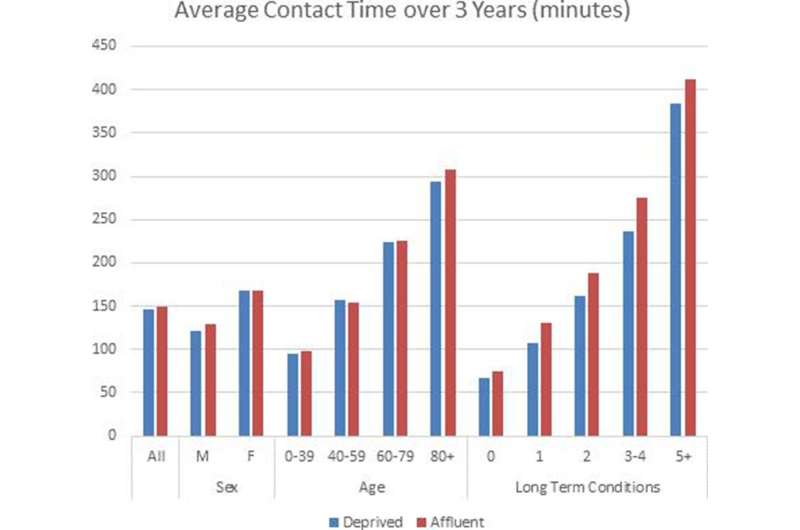This article has been reviewed according to Science X's editorial process and policies. Editors have highlighted the following attributes while ensuring the content's credibility:
fact-checked
peer-reviewed publication
trusted source
proofread
Patients in deprived areas lack adequate contact with GPs to ensure health needs are met, finds Scottish study

Scottish patients who live in socio-economically deprived communities are currently unable to see their GP for long enough to ensure their health needs are met, according to new research.
The study, led by the University of Glasgow in collaboration with the Universities of Aberdeen and Bath, found that there was a significant unmet health care need in socioeconomically deprived areas, with patients with multiple long-term health conditions most negatively impacted.
Published in the BMJ Open, the study included 150 GP practices in Scotland—80 practices in deprived areas and 70 in less deprives areas—and looked at the amount of contact time patients had with their GP and clinical staff in the period 2013–16.
From the data researchers were able to see that patients in less deprived areas had slightly more contact time with their GP practice than patients living in socioeconomically deprived areas, and that this inequity was increased for patients with multiple health conditions. Indeed, people who had three or four long-terms health conditions and lived in socioeconomically deprived areas had 38 minutes less appointment time over a three year period than comparable patients living in less deprived areas.
There is already strong evidence that people living in socioeconomically deprived areas are more likely to have one or more long-term health conditions at an earlier age. In addition, patients with multimorbidity (described as more than two long-term health conditions) are at greater risk of mortality and hospitalization.
Professor Andrea Williamson, Deep End GP and lead for the research from the University of Glasgow, said, "Patients with multiple health conditions have more complicated needs, and successfully meeting those within our health care systems is one of the most pressing challenges of our time."
"This large study shows that there is a significant unmet need in for patients who live in socioeconomically deprived areas. Indeed, for GPs in more socioeconomically deprived areas to give an equal amount of direct contact time to patients with the same level of need as patients in less deprived areas, it would require a 14% increase in patient contact time."
Professor David Ellis from The University of Bath added "This research confirms the role GP care has in perpetuating health inequalities. In response, GP provision in socioeconomically deprived areas would require more resources to deliver the same standard of care to patients across Scotland."
More information: Alex McConnachie et al, Quantifying unmet need in General Practice: a retrospective cohort study of administrative data, BMJ Open (2023). DOI: 10.1136/bmjopen-2022-068720





















